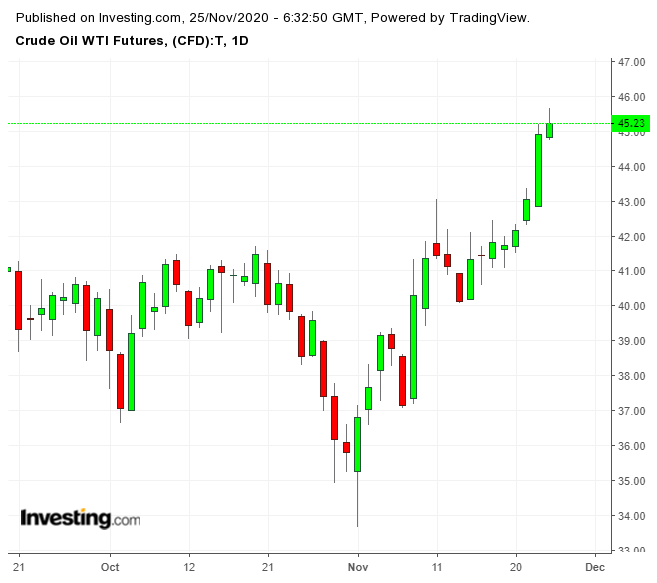Oil prices appear to have moved past negative 2020 fundamentals and currently reflect optimistic views that 2021 will see a resurgence in demand.

There are, indeed, a number of reasons to be bullish on the price of the commodity accelerating into the new year, but there are also reasons for caution. Below, we examine the case for each view:
The Bullish Case
1. Coronavirus Vaccine News: Oil futures prices are currently rallying, based on positive news that one or more coronavirus vaccines may become widely available by the end of Q1 2021 and that this will enable a return to pre-coronavirus travel patterns and oil usage.
2. Demand From Buyers In Asia: The positive sentiment is being propped up by new demand from buyers in Asia, as China recently issued a new round of refined fuel export quotas for the remaining days of 2020.
Chinese refineries had used up their export quotas back in September (as this column noted), resulting in a backlog of crude oil which refineries did not want to take delivery of. Now, because of the new Chinese quotas, those refineries can start using this crude oil.
As a result, traders should expect to see stored oil drawing down in that region.
3. Continued Production Quotas From OPEC+: A decision by OPEC+ to roll over its current production quotas for at least 3 months at the start of 2021 will also help maintain the price rally. (The final OPEC+ decision about a 3-month or 6-month rollover will come next week on Nov. 30 and Dec. 1).
However, there are key areas of weakness in the market that could slow or reverse the price rally.
The Bearish Case
1. Refinery Shutdowns And Closures: Upcoming refinery shutdowns and closures in the U.S. and Europe will mean there will be more crude on the market.
According to Reuters, Royal Dutch Shell (NYSE:RDSa) may close the 200,000 bpd refinery in Convent, Louisiana as soon as next week, and the list of refineries running at reduced rates or facing temporary or permanent shutdown in Europe is expanding (See this list from Platts).
Refineries are shutting for a variety of reasons, including: profitability concerns, uncertain demand and plans to convert to biofuel production.
2. Length Of OPEC+ Production Quotas: There is a possibility that next week OPEC+ will only decide to roll over its current production quotas for 3-months rather than 6-months, meaning that 2 million more bpd of oil production could hit the market in March 2021. If OPEC+ chooses 3-months, the market will likely react in March, even if the initial next week is tempered by expectations that have already been built in.
This, along with growing production from the U.S. shale oil industry, could stifle the price rally, especially if demand does not pick up as the market expects it to.
3. Muted Thanksgiving Travel: The future of travel, which is where most of the oil demand weakness is located, is still very much unknown. Officials are warning Americans against traveling for the Thanksgiving holiday this week. The day before Thanksgiving is typically the busiest travel day of the year.
Last year’s Thanksgiving travel set records, with TSA screening more passengers than ever. Most of the headlines have been about how millions of Americans are traveling for Thanksgiving despite warnings not to. However, the reality is that Thanksgiving travel is severely depressed this year.
AAA predicts a 5% decrease in all Thanksgiving-related travel compared to last year and a 50% decrease in air travel. Moreover, recent restrictions and admonishments by governors could further limit travel beyond these predictions.
Traders looking at gasoline consumption data should expect a jump compared to consumption over the past several weeks, but they should keep in mind that this is significantly muted compared to the previous year. Thanksgiving is a one-time event and must be compared to previous years, not to other periods in 2020.
4. Depressed Christmas Travel: It is unclear how many people in the U.S., Europe and other parts of the world will travel for the Christmas holiday, which comes up next month. Data for Thanksgiving should provide an indication of how weakened we can expect Christmas travel to be in the U.S.
In Europe, where many of the largest economies remain in lockdown, it is expected that governments may ease these lockdowns in time to allow for families to travel for Christmas. The U.K. has already announced that restrictions will be relaxed for this purpose. What remains unknown: how many people will feel comfortable traveling and whether they will be able to travel to other countries for vacations.
5. Obstacles For Air Travel Recovery: Looking ahead to when international travel may return—and with it jet fuel demand—the International Air Transport Association forecasts that we will not be back to 2019 levels until 2024. However, it does expect to see 2.8 billion passengers travel in 2021, which is 1 billion more than in 2020.
There will be some bumps along the way, especially pertaining to accessibility to coronavirus vaccines and the global populations' willingness to receive those vaccinations.
The head of Australia's Quantas airlines said the carrier plans to ask international travelers if they have received a coronavirus vaccination before allowing them to board the company's planes. He believes that this will become common amongst international carriers.
Requiring vaccinations might make some passengers more comfortable onboard planes, but it could pose a significant barrier to recovery if potential passengers refuse to vaccinate.
